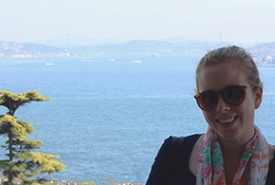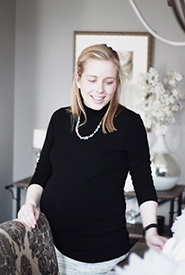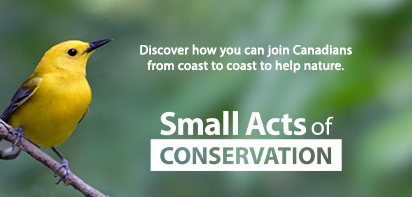
Courtney Huberts, from Nature's Aid (Photo courtesy of Nature's Aid)
Courtney Huberts: Nature's Aid
Commercial Director
When the Nature Conservancy of Canada (NCC) sat down with Courtney Huberts, we learned that Nature’s Aid, a natural beauty products company, has been around for nearly 15 years, and started as a project to find a natural solution to a problem with the company founder’s horses. Since then, the company has grown to develop several natural skin care and hair care products for both humans and their pets.
Courtney loved using the skin gel product, so when the opportunity arose to purchase the company, she couldn’t resist. She’s been involved at Nature’s Aid for 2 ½ years. Since joining the team, Courtney has taken it from the one major product they started with — the skin gel — and worked to create a line of products that use a variety natural ingredients, like aloe vera, rosemary and witch hazel.
NCC: As a consumer, have you always leaned toward natural beauty products?
CH: In the past, to be honest, not really. I did really love the Nature’s Aid product — it worked really well for me — but it’s only as I’ve gotten older, and become more aware of the importance of natural ingredients, the benefits of choosing those types of products, and the research I’ve done for our own Nature’s Aid products, that I’ve come to appreciate the value of the benefits to both consumers and the environment.
NCC: Has your support of conservation and NCC come from that interest in natural products?
CH: Just like natural products, my larger environmental awareness is something I came to later in life. Like most children, I was introduced to the basics — recycling, not littering and such. But, as I’ve grown up and gotten more familiar with the impacts that many products have on the environment, along with the risks and consequences of using those products, it’s become hard to know about the damage they can cause and not care. It really does go hand in hand.
NCC: Is NCC Nature’s Aid first environmental partnership? And if yes, what inspired that?
CH: It is, yes. We really wanted to do something that had a positive environmental impact, and had a few basic initiatives around the office. But, with the size of our company, we felt limited by our resources, and with what we could do. We really wanted to do more, so we decided that reaching out to a third party like NCC would be the best way to make a positive impact on the environment. Choosing NCC was a combination of knowing you’re a well-rated company, you do good work and that your work is tangible; you’re conserving something real. There’s also the fact that we’re a Canadian brand, and that we’ve been using a lot of natural Canadian imagery to promote our products and as a part of our marketing campaigns; it defines what we do. It just seemed like a natural fit to partner with an organization that helps preserve that natural beauty.
NCC: Are you finding that these types of partnerships are common among other organizations and businesses you’re familiar with, the link between natural beauty products and conservation groups?
CH: Because our consumers are more environmentally aware, I’ve noticed that a lot of people in the industry have put an emphasis on being environmentally responsible in some form, perhaps through packaging or other initiatives, and it’s happening more and more. Not as many create formal partnerships with organizations, but the environment as a whole is something the industry cares about, and it’s really being driven by consumers.
NCC: Would you say that partnerships with conservation organizations are the "next level," as companies grow?
CH: Personally, I think so. One of the reasons we wanted to partner with an organization like NCC is that for small companies like us, or maybe even medium-sized companies, resources are often really limited. The dollar we can spend with you goes MUCH further, in terms of actually making a difference, than any of the initiatives we’d start ourselves.
NCC: Would you say that partnering with NCC is an easy option?

Face of NCC Ontario, Courtney Huberts, from Nature's Aid (Photo courtesy of Nature's Aid)
CH: It’s definitely easy and straightforward. We can tell that you work well together as a team, and that makes things easier for us — understanding what to do, understanding promotions. Setting up the partnership couldn’t have been any easier.
NCC: What new initiatives does Nature’s Aid have coming down the line?
CH: We have quite a few things coming down the line. We launched a new line of natural bars soaps — they’re coconut and olive oil based — something we really stress as important. We wanted to source ingredients that were sustainable. That was important to us. We also have two new versions of our skin gel, our most popular product: one with lavender (instead of tea tree), and one with almond oil for extra moisturizing.
NCC: And (out of curiosity) do the horses you mentioned still use the gel?
CH: Yes…We have a pet products side of the brand that’s small, but growing. Pet parents will use the product on dogs, horses (a lot of equine stores carry it). It’s just a good way to deal with a pet’s skin issues in a natural way, without having to spend a lot of money on really expensive prescriptions.
NCC: Is there anything you’d like to tell other business owners about taking steps toward conservation?
CH: I’d start by suggesting to organizations that are interested in conservation that, first thing, business owners should lead by example, to truly embrace environmental initiatives at the office and not just talk about them. And, secondly, it’s really important for everyone in the business to get everyone involved. It generates momentum, and when everyone in the company is involved, you can really strategize different kinds of solutions; other ways, other ideas around how to make a difference.
Creating less waste, saving on energy — you often find that the best ideas will come from the team.




